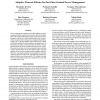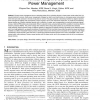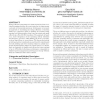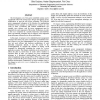AAAI
2007
14 years 3 months ago
2007
Power management techniques for mobile appliances put the components of the systems into low power states to maximize battery life while minimizing the impact on the perceived per...
ISLPED
1995
ACM
14 years 4 months ago
1995
ACM
The need to reduce the power consumption of the next generation of digital systems is clearly recognized. At the system level, power management is a very powerful technique and de...
EUROSSC
2006
Springer
14 years 4 months ago
2006
Springer
Effective and efficient power management remains one of the most formidable obstacles that must be overcome before Wireless Sensor Networks can be deployed on a widespread basis. E...
ECRTS
2004
IEEE
14 years 4 months ago
2004
IEEE
Computing systems, ranging from small battery-operated embedded systems to more complex general purpose systems, are designed to satisfy various computation demands in some accept...
DATE
2004
IEEE
14 years 4 months ago
2004
IEEE
Dynamic power management aims at extending battery life by switching devices to lower-power modes when there is a reduced demand for service. Static power management strategies can...
ICAC
2007
IEEE
14 years 4 months ago
2007
IEEE
It has recently become clear that power management is of critical importance in modern enterprise computing environments. The traditional drive for higher performance has influenc...
EENERGY
2010
14 years 4 months ago
2010
Energy-efficient computing as a research area has been receiving increasing attention in recent years due to rising energy costs and environmental awareness. In this paper, we pre...
ASPDAC
2007
ACM
14 years 4 months ago
2007
ACM
The development cost of low-power embedded systems can be significantly reduced by reusing legacy designs and applying proper modifications to meet the new power constraints. The ...
ICCAD
1999
IEEE
14 years 5 months ago
1999
IEEE
Dynamic Power Management (DPM) is a technique to reduce power consumption of electronic systems by selectively shutting down idle components. The quality of the shutdown control a...
ISLPED
1999
ACM
14 years 5 months ago
1999
ACM
-- The goal of a dynamic power management policy is to reduce the power consumption of an electronic system by putting system components into different states, each representing ce...




